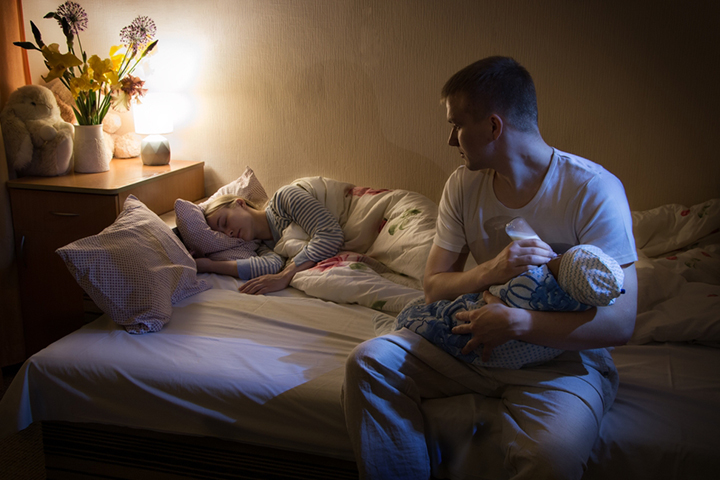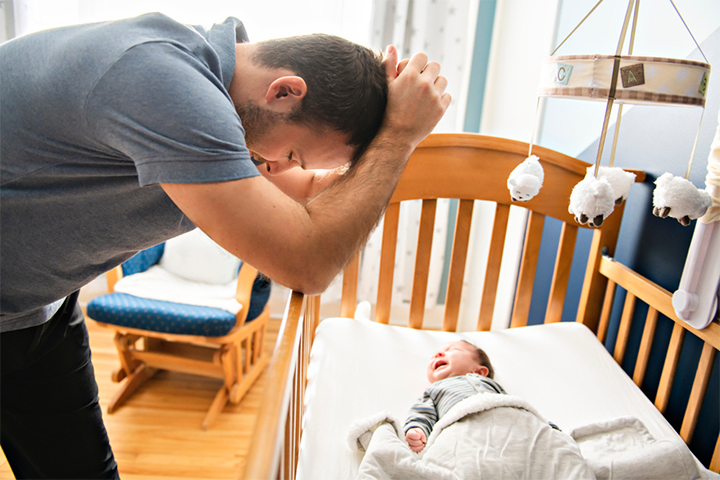
Image: Shutterstock
Did you realize that women aren’t the only ones who undergo transformations when they become parents? Pregnancy and childbirth can lead to numerous physical and psychological changes in a new mother’s body, but it’s worth noting that men can also experience a wide range of bodily and mental transformations when they become fathers. Men, too, can navigate a rollercoaster of emotions, including hormonal shifts and, interestingly, pregnancy-related symptoms. While these changes may manifest differently in men compared to women, they are indeed present. It’s quite remarkable! Many men experience significant changes after the arrival of a baby, and it’s high time we paid close attention to their experiences as well. Would you like to understand how you or your partner might undergo psychological and physical changes after welcoming a child? Continue reading to find out!
1. The Level Of Testosterone May Drop
Image: Shutterstock
We are familiar with the fact that women produce estrogen while men produce testosterone. High testosterone levels are associated with behavioral traits such as aggression, competitiveness, and attracting potential partners. However, something intriguing occurs when men become fathers. Their testosterone levels appear to decrease (1). This suggests a redirection of a man’s energy towards the well-being of his family rather than outward expressions. Studies also indicate that men who are already in committed relationships and those who have children tend to have lower testosterone levels compared to men without children or those who are still seeking a partner (2). This may be nature’s way of shifting a man’s priorities over time. It seems that male bodies have evolved to lower testosterone levels in order to reorient men towards becoming devoted fathers.
2. The Level Of Oxytocin And Dopamine Rises
Image: Shutterstock
Indeed, additional hormones come into play. Reduced testosterone levels open the door for new hormones to circulate in a man’s bloodstream. Among these, oxytocin and dopamine play a pivotal role, as these two chemicals are responsible for forging the bond between a parent and their child (3). When a man becomes a father, the levels of oxytocin and dopamine increase, enhancing the pleasure he derives from playing and cuddling with his newborn. It’s truly remarkable!
3. Hormonal Highs And Lows Can Lead To Postnatal Depression
Image: Shutterstock
Most of us are familiar with postnatal depression in women, as it is more prevalent and easily recognizable. However, it might come as a surprise to learn that men can also grapple with postnatal depression. While it may not be as widely acknowledged, it’s not as far-fetched as it may seem. In addition to its other functions, testosterone plays a significant role in shielding us from low moods, and when its levels decrease, new fathers may become vulnerable to depression (4). These hormonal shifts, combined with the added responsibilities of fatherhood, can be quite overwhelming for men, making them susceptible to mental health challenges. This underscores the importance of recognizing that hormonal and behavioral changes also occur in fathers’ bodies.
4. Some Brain Changes May Happen As Well
Image: Shutterstock
Interestingly, the hormonal shifts associated with fatherhood can also influence changes in the brain. Scientists conducted a study examining the brain activity of a group of new fathers and observed significant alterations in gray matter during the initial four months following childbirth (5). These changes are vital, as they contribute to the development of new parenting skills and the formation of a strong bond with their infants. It’s well-known that these early interactions between fathers and their babies not only establish a firm foundation for the future parent-child relationship but also play a substantial role in the child’s cognitive and social development as they grow. In the brain of a new father, you may observe increased activity in very specific areas related to planning, problem-solving, and risk detection. In essence, these areas help fathers ensure the safety and well-being of their babies. It’s truly heartening to witness!
5. Men Can Experience High Levels Of Emotional Stress
Image: Shutterstock
Mums aren’t the only ones under pressure once the baby arrives. Yes they are more directly responsible to fulfill; the needs of the baby, such as, nursing and soothing them. But parenting responsibilities can result in high levels of stress and anxiety in new dads as they have a new family member who relies upon them and who they need to provide for. The unfortunate thing is that most men don’t feel like they can seek help when they feel stressed and frustrated with their new duties. They don’t want to shift focus from their female partners and worry them. But it is completely normal for men to go through an emotionally turbulent time after the baby arrives and seeking help will help them cope with all the changes better.
New fathers go through many changes psychologically and physically and this needs to be addressed as well. This is why it is so important for partners to spend time with each other and bond as a family during those first crucial months. Support and bring out the best in each other. Happy parenting!

















